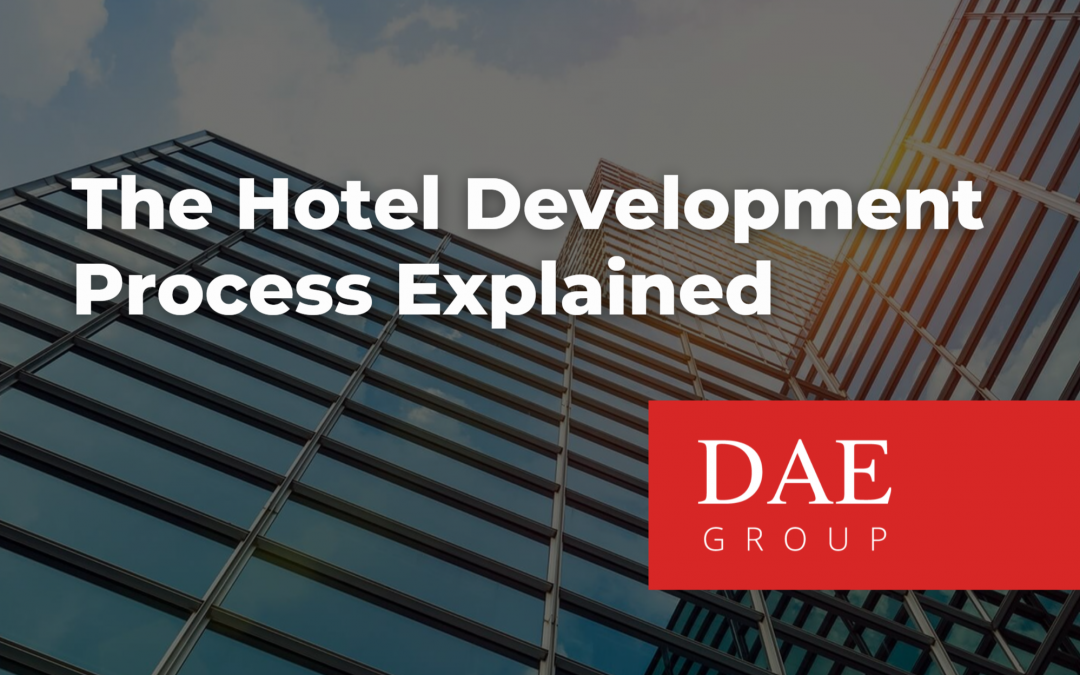Introduction
The hotel development process is the act of bringing an idea or concept for a hotel to a successful completion as a brick and mortar location with all associated services such as hotel rooms, meeting space, ballrooms, bars & restaurants, pools, gyms, and parking facilities. It is a very complex process requiring a myriad of professionals all coordinated and aimed at the hotel’s ultimate success.
The process will vary slightly depending on the specifics of each individual situation and on the type of hotel being considered such as budget and value hotels, inns, B&Bs, mid-range, business hotels, family hotels, beach & vacation hotels, resort hotels, etc.
The hotel development process revolves around the hotel property developer. The hotel property developer is the initiator of the project and is the intermediary between the property and the project service providers and the party that will be operating the hotel through its life cycle.
When successful, hotels are an excellent way to generate income and build long-term wealth. What is unique about hotels is that the can adjust their room rates on a daily basis giving them the unique ability to match prices to demand. But please beware that hotels can be the riskiest type of real estate development because of the development costs and operating cash required, and because of the short-term nature of the leases.
The Hotel Development Process
Different approaches and viewpoints of the hotel development process exist. Generally, the key development phases of hotel development include:
- Conceptual / Planning
- Feasibility
- Procurement
- Construction
- Operational / Asset Management Over time
What specific activities go into each phase of hotel development will vary from project to project. Below is a quick overview of some of the types of activity that go on in each phase of the hotel development process:
Conceptual /Planning
- Internal developer organizational analysis – who we are, where are we now, where do we want to be, how we are going to get there, how the “hotel” opportunity fits into our overall strategy
- Preliminary audits of macro environment, hotel market analysis, competition, internal audits of developer’s expertise understand gaps and ultimately create a team of expertise. There is continuous market surveillance going on.
- Development of Project Objectives
- Financial, developmental, operational
- Assembly of development team
- Development of strategy and criteria which may include site location, market segments to go after, building ownership structure, brands to consider for hotel management/operator, building owner /equity structure
- Gathering of data for feasibility
Feasibility
The feasibility stage consists of a highly-detailed analysis of:
- Macro environment feasibility
- Physical feasibility
- Market feasibility
- Financial feasibility – financing options
- Operator audit which includes looking into track record of success, competitive advantages, pluses and minuses of each, development requirements, etc.
- Development of estimates, budgets, costs, cash flow pro formas, etc.
Procurement
- Final owner /equity situation
- Selection and negotiation with Brand operator – which Brand makes the most sense?
- Secure financing
- Gain control of site, selection of architect, design, construction contractor, owner’s representative, construction team
- Final contract negotiations with stakeholders
- Final design and documentation including furniture, fixtures, equipment
- Final budgets / commitment point
- Begin Pre-construction
Construction
- Site preparation / actual construction
- Monitoring of budgets and schedules for on-time, on-budget assessments
- Ongoing quality reviews
- Completing contracts with vendors / documentation
- Securing occupancy permits
Operational
- Development and initiation of operations / team / staffing
- Initial and ongoing sales and marketing efforts
- Ongoing management of the hotel asset which includes operations, sales and marketing, and maintenance / upkeep of the asset
- Possible rebranding / operational changes as market conditions change
Distinguishing Success Factors
- As a developer goes through the hotel development process certain distinguishing success factors stand out for consideration, including:
- Clear criteria and objectives must be established for the project to stay on-track.
- The synching up of the site location, target audience, brand operator and development team is essential for success.
- The feasibility phase should not be shortchanged as the financial considerations, marco-environment, physical environment and market environment must be aligned.
- When selecting team members consideration must be given to capacity, experience, track record, current workload, and then price.
- Site location, accessibility for guests, design of hotel and theme must match up with the marketplace reality.
- Selection of “the right” brand operator
- Ultimately a hotel is a service business. Match the service level to the target audience. Staffing and management very important.
Conclusion
Developing a hotel is not one for the faint-hearted. From conception to ribbon-cutting to ongoing maintenance and upkeep, the hotel development process requires a clear vision, immense strategic planning and lots of perseverance.
In addition to the traditional challenges of opening a new business, today’s economic environment requires developers to vet every decision more thoroughly than ever before to successfully determine where to develop, what type of hotel to build, and how it will attract customers in today’s ever-changing markets.

